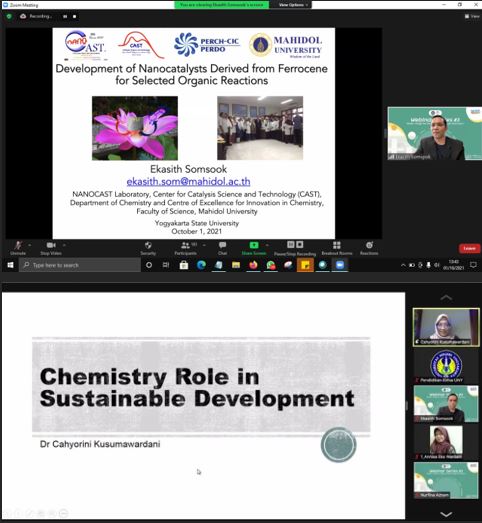 Bahasa Indonesia
Bahasa Indonesia English
English
You are here
Webinar Series #3: Chemistry Education Department, 2021

Webinar Series #3 Chemistry Education Department, Faculty of Mathematics and Natural Sciences, UNY was held on Friday, October 1, 2021 through Zoom Meeting. This activity was attended by a total of 240 participants from among lecturers, teachers, students, and practitioners. In this Webinar Series #3, Assoc. Prof. Dr. Ekasith Somsook of the Department of Chemistry and Center of Excellence for Innovation in Chemistry, Faculty of Science, Mahidol University and Dr. Cahyorini Kusumawardani from the Chemistry Study Program, FMIPA UNY, participated as a speaker.
The first material was delivered by Dr. Ekasith, which is about one of the results of his research entitled Development of Nanocatalyst Derived from Ferrocene for Selected Organic Reactions. Based on the material presented, to develop a nanocatalyst requires nanometal particles and metal oxides that are useful for stabilizing the activity of nanoparticles, using the Ullman method. Nano catalyst developed by Dr. Ekasith based on Ferrocene which is an organometallic compound, has good redox properties, and can increase electron transfer in the catalyst system. Ferrocene and ferrocenated compounds were discovered in the 1950s, have a sandwich structure, and won the Nobel Prize in 1973. If Ferrocene is added concentrated H2SO4 will be oxidized and after adding NaOH turns into ferrocenated compounds The decomposition of ferrocenium cations in sodium hydroxide solution is required to produce ferrocenated compounds. The conclusion of the research of Dr. Ekasiths include (1) successfully synthesized nanocatalysts for the transformation of organic compounds; (2) The palladium-catalyzed Ullman Coupling reaction results in (a) activation of C-Cl at low temperature in a green reaction medium, (b) the catalyst can be reused at least 5 times, (c) excess chloride and acetate ions inactivate the activity of the catalyst.
The second material was delivered by Dr. Cahyorini Kusumawardani who is a lecturer in Chemistry Study Program, FMIPA UNY. On this occasion he conveyed about the Chemistry Role in Sustainable Development. The crises that affect current and future generations of people include: (1) Food, (2) Health, (3) Energy, and (4) The effects of COVID-19 on mental health so that a sustainable development paradigm is needed to resolve the crisis. the. Chemistry has an important role in the SDGs such as: (1) having a unique position to make a difference, (2) research on new chemicals, (3) green and sustainable chemistry education, (4) environmentally friendly and sustainable chemical manufacturing practices, (5 ) present and future social responsibility to protect the earth, (6) efficient use of natural resources, (7) improve energy efficiency, (8) new use of waste products, and (9) development of sustainable materials.
Through the material presented by the speakers at the Webinar Series #3 is hopefully an insight that chemistry has an important role in civilization and crises related to science, food, health, and energy. Through community participation in its role as consumers, it is the responsibility to protect the earth. Simple things that can be done include rejecting, reducing, recycling, and reusing plastic products.
Sistem Informasi
Kontak Kami
Program Studi Pendidikan Kimia
FMIPA Universitas Negeri Yogyakarta
Gedung Dekanat D.07 FMIPA UNY
Kampus Karangmalang Yogyakarta 55281
Telp. (0274)586168 Pes. 115
Email: pend_kimia@uny.ac.id
Copyright © 2024,
